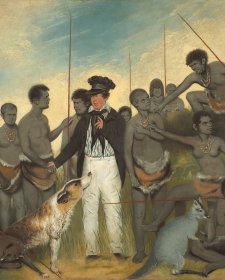Wurati (active 1830s, d. 1842), was a Nuennone man from Bruny Island, a skilled hunter, boat builder and renowned storyteller who spoke five dialects. In 1829 Wurati decided to join the party associated with George Augustus Robinson (1788–1866), a free settler and lay preacher appointed to the position of ‘Conciliator of Aborigines’ so as to effect the removal of Tasmania’s Indigenous people to Flinders Island in Bass Strait. This strategy had been conceived by the colonial government, amidst escalating hostilities, for the supposed protection of the Aboriginal and non-Aboriginal communities alike. Accompanied by a group of Aboriginal leaders who acted as his guides and interpreters, Robinson conducted a series of expeditions – collectively known as the Friendly Mission – between 1830 and 1835, during which the surviving tribes were persuaded into exile. Wurati and his second wife, Trukanini, became Robinson’s trusted assistants, yet remained fiercely proud of their traditions and identity. Wurati refused to adopt European diet or dress and maintained traditional practices, such as the use of ochre and grease for his hair and beard, even while at Wybalenna – the mission station on Flinders Island to which over one hundred Tasmanian Aboriginal people were eventually exiled. Many died there while waiting for the fulfilment of the promise that they would be allowed to return to their country. In 1839, Wurati was one of the fourteen Tasmanians who went to Port Phillip following Robinson’s appointment to the position of Chief Protector of Aborigines in the new colony. He died on his return journey to Wybalenna in July 1842.







